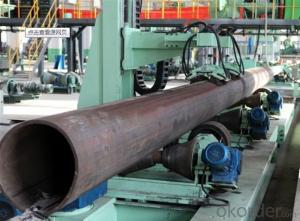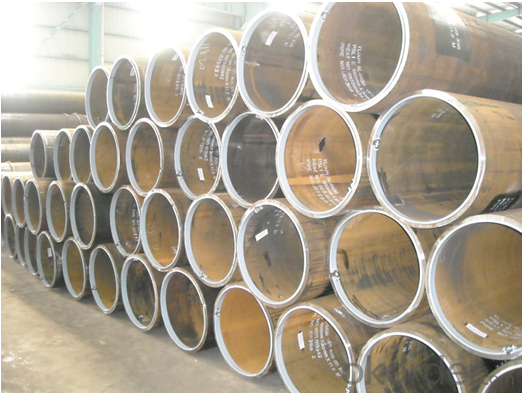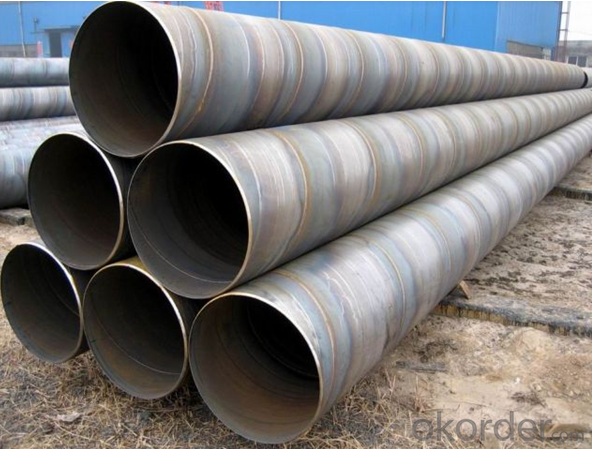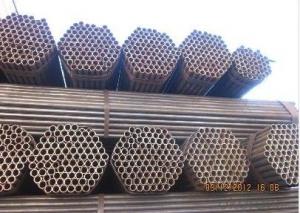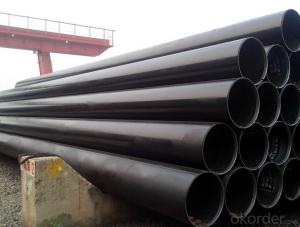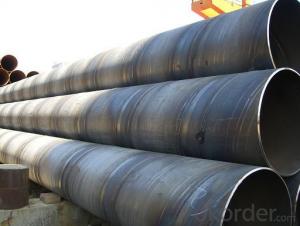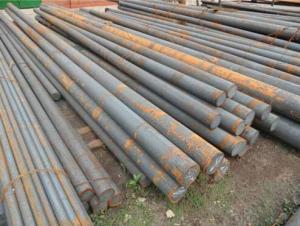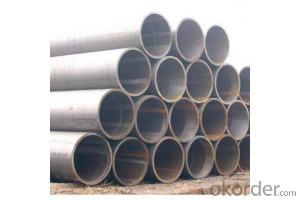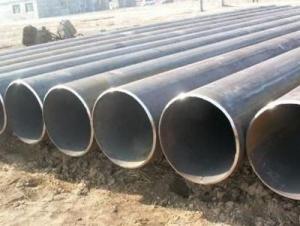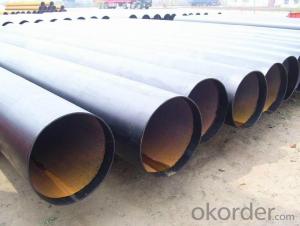API5L CARBON STEEL LSAW PIPE Gr.B,X42-X70 PSL1
- Loading Port:
- China Main Port
- Payment Terms:
- TT or LC
- Min Order Qty:
- 25MT m.t.
- Supply Capability:
- 9000MT m.t./month
OKorder Service Pledge
OKorder Financial Service
You Might Also Like
Product Description:
1、Structure of API5L CARBON STEEL LSAW PIPE Gr.B,X42-X70 PSL1 Description:
2、Main Features of the API5L CARBON STEEL LSAW PIPE Gr.B,X42-X70 PSL1:
• High manufacturing accuracy
• High strength
• Small inertia resistance
• Strong heat dissipation ability
• Good visual effect
• Reasonable price
LSAW PIPE is formed by drawing a solid billet over a piercing rod to create the hollow shell. As the manufacturing process does not include any welding, seamless pipes are perceived to be stronger and more reliable. Historically seamless pipe was regarded as withstanding pressure better than other types, and was often more easily available than welded pipe.
3、 API5L CARBON STEEL LSAW PIPE Gr.B,X42-X70 PSL1 Images:
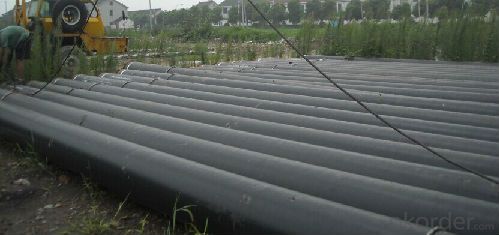
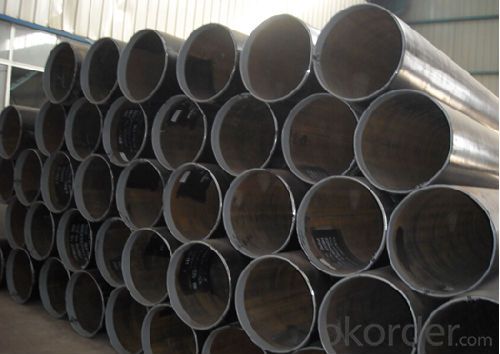
- Q: Does the seamless steel pipe need rust removal?
- Spray (throw) shoot derusting by the high-power motor to drive the spray shot (impeller) blade rotating speed, the steel grit, steel shot, iron wire, minerals and other abrasive jet for 20# seamless steel tube surface under the action of centrifugal force (left) radiation treatment, not only can completely remove the dirt and rust, oxide, and the role of 20# seamless steel in abrasive blast and friction force, can achieve the required uniform roughness.Not only can the physical adsorption effect on the surface of the pipe be increased, but also the mechanical adhesion of the anticorrosive layer to the pipe surface can be enhanced. Therefore, spraying (throwing) shot derusting is an ideal method of rust prevention for pipeline corrosion protection. Generally speaking, shot peening (sand) derusting is mainly used in the inner surface treatment of tubes, shot blasting (sand) derusting is mainly used for the outer surface treatment of tubes.
- Q: How are steel pipes graded?
- Steel pipes are graded based on several factors to determine their quality and suitability for specific applications. The grading system for steel pipes typically includes parameters such as the chemical composition, mechanical properties, manufacturing method, and testing standards. 1. Chemical composition: Steel pipes are graded based on the elements present in their composition. This includes the amount of carbon, manganese, phosphorus, sulfur, and other alloying elements. The chemical composition greatly influences the pipe's strength, corrosion resistance, and other properties. 2. Mechanical properties: The mechanical properties of steel pipes are crucial for determining their strength, flexibility, and resistance to pressure and temperature. These properties include tensile strength, yield strength, elongation, hardness, and impact toughness. Pipes with higher mechanical properties are generally graded higher. 3. Manufacturing method: Steel pipes can be manufactured using various methods, such as seamless, welded, or ERW (Electric Resistance Welding). The manufacturing method affects the pipe's integrity, dimensional accuracy, and overall quality. Seamless pipes, for example, are considered to have higher quality due to their uniformity and absence of weld seams. 4. Testing standards: Steel pipes are graded based on their adherence to specific testing standards. These standards ensure that the pipes meet the required quality criteria and are suitable for their intended applications. Common testing standards include ASTM (American Society for Testing and Materials), API (American Petroleum Institute), and EN (European Norms). Based on these factors, steel pipes are often graded using alphanumeric codes or specifications. For instance, pipes used in oil and gas industry may be graded as API 5L (American Petroleum Institute) or pipes used for structural purposes may be graded as ASTM A500 (American Society for Testing and Materials). In conclusion, steel pipes are graded based on their chemical composition, mechanical properties, manufacturing method, and adherence to testing standards. These grades help customers and manufacturers in selecting the appropriate pipes for specific applications, ensuring safety, durability, and efficiency in various industries.
- Q: What is the density of steel pipes?
- The density of steel pipes fluctuates based on the particular grade and composition of the steel employed. On the whole, steel pipes generally possess a density of approximately 7.8 grams per cubic centimeter (g/cm³) or 7800 kilograms per cubic meter (kg/m³). It should be emphasized that this figure may undergo slight variations contingent upon factors such as the manufacturing technique and the specific alloy integrated into the steel.
- Q: How are steel pipes used in fire protection systems?
- Steel pipes are commonly used in fire protection systems because of their durability and resistance to high temperatures. They are used to transport water or other fire suppressants to sprinkler heads or fire hydrants, ensuring quick and efficient extinguishing of fires. The strength of steel pipes also allows them to withstand the pressure and force of water flow, making them a reliable choice for fire protection systems.
- Q: Can steel pipes withstand high temperatures?
- Yes, steel pipes can withstand high temperatures as they have a high melting point and excellent heat resistance properties, making them suitable for various industrial applications involving high temperature environments.
- Q: What does cathodic protection of steel tubes mean?
- Applied current: a macro cell consisting of a protected metal piece and an insoluble auxiliary component. The negative electrode of the battery is connected to the metal to be protected. The power supplies the electrons so that the metal is not corroded by missing points.
- Q: What are the advantages of using steel pipes in plumbing systems?
- There are several advantages to using steel pipes in plumbing systems. Firstly, steel pipes are highly durable and resistant to corrosion, making them ideal for carrying water and other fluids. They can withstand high pressure and extreme temperatures, ensuring long-term reliability. Additionally, steel pipes have a smooth interior surface, resulting in less friction and improved flow efficiency. They are also fire resistant, reducing the risk of accidents. Moreover, steel pipes are eco-friendly as they can be recycled, promoting sustainability. Overall, steel pipes offer strength, longevity, and reliability, making them a preferred choice in plumbing systems.
- Q: Are steel pipes suitable for underground installations?
- Yes, steel pipes are suitable for underground installations. Steel pipes have been widely used for underground applications due to their durability, strength, and resistance to corrosion. They are able to withstand high pressure and extreme temperature variations, making them ideal for transporting various substances such as water, gas, and oil underground. Additionally, steel pipes are highly resistant to environmental factors such as moisture and chemicals, which are commonly found in underground environments. With proper coatings and cathodic protection systems, steel pipes can have an extended lifespan and remain intact even in harsh underground conditions. Therefore, steel pipes are a reliable and suitable choice for underground installations.
- Q: What is the cost of steel pipes compared to other piping materials?
- The cost of steel pipes can vary based on factors like size, grade, and specifications, as well as market conditions and location. Generally, steel pipes are more expensive than materials like PVC or HDPE. However, when compared to materials like copper or stainless steel, steel pipes can often be more cost-effective. Steel pipes are known for their durability, strength, and resistance to high pressures and temperatures, making them suitable for various applications such as oil and gas pipelines, plumbing systems, and structural supports. Their longevity and reliability can offset the initial higher cost, as they require less maintenance and have a longer lifespan than other materials. Moreover, steel pipes are readily available in different sizes and grades, making them versatile and adaptable to different project requirements. This availability and versatility contribute to their cost-effectiveness, as they can be easily sourced and customized to specific needs. It is important to consider that prices for steel pipes can fluctuate due to market conditions and factors like raw material costs, transportation expenses, and labor charges. Therefore, it is advisable to consult with suppliers or industry experts for accurate pricing information based on specific project specifications and market conditions.
- Q: How are steel pipes used in the construction of power transmission lines?
- Due to their exceptional strength, durability, and versatility, steel pipes are commonly utilized in the construction of power transmission lines. Throughout the project, these pipes serve various purposes that contribute to the overall efficiency and reliability of the power transmission system. One primary application of steel pipes in power transmission line construction involves the installation of transmission towers. These pipes function as structural components, providing support for the transmission lines and maintaining their alignment. The high strength of steel ensures that the towers can withstand the weight of the transmission lines, as well as external forces like wind and ice loads. Additionally, steel pipes offer excellent resistance against corrosion, which is vital for ensuring the longevity of the transmission tower structures. Apart from tower construction, steel pipes are also utilized in underground transmission lines. These pipes act as conduits for the cables, safeguarding them from external elements and potential damage. Steel pipes are particularly advantageous in this application due to their ability to resist soil movement, withstand high pressure, and provide a secure pathway for the power cables. Moreover, the durability of steel ensures the integrity and longevity of the underground transmission lines, reducing maintenance needs and enhancing the overall reliability of the power transmission system. Furthermore, steel pipes are employed in the construction of foundations and anchors for transmission towers. These pipes are driven deep into the ground to offer stability and support to the towers. The inherent strength and rigidity of steel pipes make them ideal for this purpose, as they can withstand heavy loads and ensure the stability of the transmission towers even in adverse weather conditions. In conclusion, steel pipes play a critical role in power transmission line construction by providing structural support, protecting cables, and ensuring the overall reliability and efficiency of the transmission system. The exceptional strength, durability, and resistance to corrosion make steel pipes the ideal choice for power transmission line construction projects.
Send your message to us
API5L CARBON STEEL LSAW PIPE Gr.B,X42-X70 PSL1
- Loading Port:
- China Main Port
- Payment Terms:
- TT or LC
- Min Order Qty:
- 25MT m.t.
- Supply Capability:
- 9000MT m.t./month
OKorder Service Pledge
OKorder Financial Service
Similar products
Hot products
Hot Searches
Related keywords
